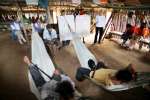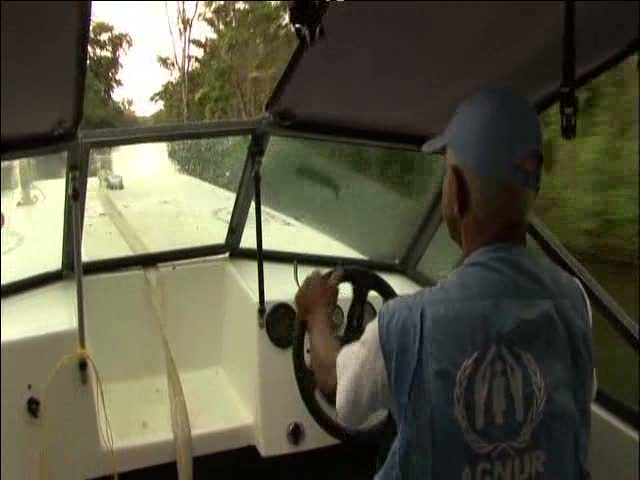Micro-credit scheme helps Colombian refugees rebuild lives in Venezuela
News Stories, 3 January 2007

GUASDUALITO, Venezuela, 3 January (UNHCR) – When Andres fled to Venezuela last year from Colombia, one of the first things he did was to call the local police to ask if he was entitled to look for work. The response was encouraging. He was told many Colombians like him lived and worked in the area. The police also gave him the phone number of UNHCR's office in Guasdualito.
In his native Arauca, Andres led an association of local farmers, or campesinos as they are known in Colombia. Forced to flee after years of intimidation escalated into death threats, Andres decided to switch jobs completely when he arrived in Apure State, western Venezuela. With a knack for mechanics and a reputation for being able to fix any old trucks or tractors, he opened a small car-repair workshop.
"For a campesino to lose his identity as a farmer is a terrible thing," Andres said. "But when I arrived here I did not want to do anything that reminded me of our life back home. That's what this war did to us. It took away not just our land but also our sense of who we are."
But, Andres is determined to forge ahead. Under a programme financed by UNHCR, he is applying for a micro-credit to kick-start his business. The sum involved is a small one – less than US$200 – but it will allow him to buy some tools and even print leaflets to advertise his workshop. He intends to repay the money very quickly in order to apply for a larger loan.
"Micro-credits are not only about income generation," says José Sieber, UNHCR's office head in Guasdualito. "They also serve to rebuild the self-confidence of people who have lost everything. The vast majority of people who get a loan repay it, not just on time but even before schedule. The money goes back into the programme with the idea that little by little we will have more money to loan out."
The micro-credit programme in Venezuela started in late 2005 in all three border states where UNHCR has a field presence – Apure to the south, Táchira and Zulia. The programme is administered by FINAMPYME, a Venezuelan cooperative specialising in small businesses and micro-credit. There are similar programmes in neighbouring Colombia, as well as in Ecuador and Panama. In each country, priority is given to the border regions, which are often economically deprived and receive the highest number of refugees and displaced people.
The purpose of the loans varies from buying a sewing machine, to setting up a small shop or buying seeds and tools for a farm. All proposals are considered as long as they are sustainable and applicants demonstrate personal commitment and the necessary skills. Last year, some 300 people benefited from the programme in Venezuela, a modest beginning on which UNHCR hopes to build further in the coming years. More than half of the loans go to women.
Andres' workshop is already doing good business. Even the local military bring their trucks to get fixed. He has so much work that he is now looking for an assistant. He feels he ought to give the job to a newly arrived fellow Colombian. News from Andres' home region of Arauca has been bad lately – fighting between two irregular armed groups and many young men fearing forcible recruitment area crossing the border into Venezuela.
Andres has other ambitions besides his car repair workshop. His love for the land did not lay dormant for long and he now dreams of setting up a farming cooperative for Colombian refugees in the area.
"We could grow food to help the families who arrive here with absolutely nothing," he said. "One thing I have learnt from this experience is that without each other we are nothing, so we have to help each other out."
Andres knows that micro-credit loans are too small to buy the land he needs to make his dream come true. Instead, he wants to negotiate with the local authorities for the use of vacant public land – an initiative that has the full support of UNHCR.
By Marie-Hélène Verney in Guasdualito, Venezuela













































